Vitra’s Occasional Table LTR is a small, elegant and versatile table designed by Charles and Ray Eames in 1950. The name LTR comes from the words Low Table Rod Base, which sums up well its structure and size. Occasional Table LTR can be used as a small side table or a bedside table, and it also looks great in a group of several tables. The Eameses used the LTR tables at their home for various different purposes, and the tables still are on display at the famous Eames House.
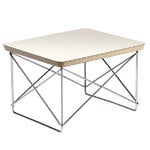
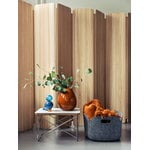
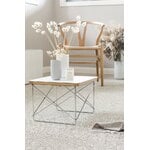
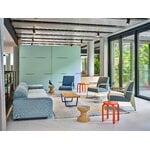
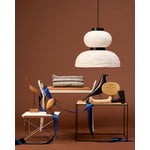
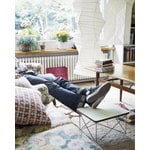
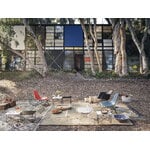
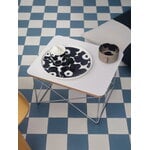
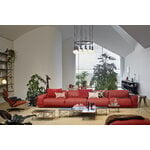
Eames LTR Occasional table, white - chrome
Vitra
Description
Vitra’s Occasional Table LTR is a small, elegant and versatile table designed by Charles and Ray Eames in 1950. The name LTR comes from the words Low Table Rod Base, which sums up well its structure and size. Occasional Table LTR can be used as a small side table or a bedside table, and it also looks great in a group of several tables. The Eameses used the LTR tables at their home for various different purposes, and the tables still are on display at the famous Eames House.
Product details (6)
- Colour
- White, chrome
- Width
- 15.43 in (39.2 cm)
- Depth
- 13.19 in (33.5 cm)
- Height
- 9.84 in (25 cm)
- Table top material
- Plywood, laminate
- Frame material
- Chrome plated steel
- Product ID
Designer
Ray and Charles Eames were an American designer couple whose name is familiar for anyone with an interest in modern design. Charles Eames was born in 1907 in St. Louis, Missouri. He studied architecture at University of Washington and, invited by the Finnish architect Eliel Saarinen, continued his studies at the Cranbrook Academy of Arts, Michigan in 1940. There he met Eero Saarinen, with whom he participated in a competition called ”Organic Design in Home Furnishing”, arranged by New York’s MoMA. Eames and Saarinen won the competition using a plywood moulding technique originally developed by Alvar Aalto. In Cranbrook Charles Eames also met her future wife Ray, and the couple got married in 1941.
Ray Eames (née Kaiser) was an artist and photographer born in 1912 in Sacramento, California. She created a significant career as a furniture designer starting from 1941, when she began moulding plywood into furniture together with Charles Eames. In 1946, the Eameses exhibited their work at MoMA, and in 1948 Herman Miller began producing their designs. In 1949, the famous Eames House was build in California – besides a home, the Eames House was also space for exhibitions of many notable designers of the time. In 1950s the Eameses started to focus more on photography and cinema.
During their career, Charles and Ray Eames were awarded with many prestigious design awards, such as the British Royal Gold Medal and the Twenty-five Year Award by the American Institute of Architects, and in 1985 the Industrial Designers Society of America gave the Eameses ”The Most Influential Designer of the 20th Century" recognition. Charles Eames continued his productive career until his death in 1978, and Ray passed away in 1988, ten years to the day after Charles.
The designs of Ray and Charles Eames, such as the iconic Lounge Chair, different versions of the Plastic Chair and the ’Hang it all’ coat rack, have always been essential part of Vitra's production. Eameses’ influence on Vitra is more than just furniture – even today, their design philosophy influences Vitra’s values, course and goals.
Would you like to read more about Charles and Ray Eames and their work? Discover our books:
Eames, Eames Furniture Sourcebook, Essential Eames – Words & Pictures, The Design Book, Woman Made: Great Women Designers, Case Study Houses, Women in Design, Mid-Century Modern Design, Mid-Century Modern: Icons of Design, A Century of Colour in Design












